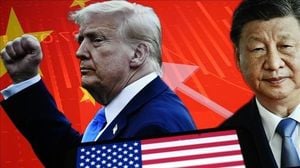Mikel Arriola has been named the interim Commissioner of the Mexican Football Federation (FMF) following the resignation of Juan Carlos Rodríguez. The announcement, made on December 13, 2024, came after Rodríguez stepped down during the Liga MX owners' meeting.
Rodríguez resigned for personal reasons after he was unable to secure sufficient support from the Liga MX team owners for the introduction of a proposed investment fund. This fund, aimed at injecting significant financial resources—reportedly around $1.25 billion—into Mexican football was the centerpiece of negotiations led by Rodríguez, who had assumed his role just months earlier.
According to the FMF's official statement, they expressed their gratitude toward Rodríguez, stating, "Le deseamos el mayor de los éxitos en sus proyectos futuros," emphasizing his contributions to Mexican football.
With Rodríguez's departure, the Liga MX owners convened and appointed Arriola, who has been serving as the president of Liga MX since December 2020, to fill the vacancy on an interim basis. The assembly underscored the importance of moving forward with the investment negotiations, urging Arriola to establish a committee of owners to continue working on the fund's introduction and to reinforce the governance structure of the organization.
Arriola finds himself at the helm of the FMF during a pivotal time, as the country prepares to host the upcoming World Cup. He has been closely involved with the negotiations surrounding the investment fund, having partnered with Rodríguez throughout discussions with various Liga MX teams.
The ownership assembly's decision to appoint Arriola points to their recognition of his experience and ability to navigate the challenges facing Mexican football. His previous tenure has not been without controversies, mainly due to alterations he implemented, such as eliminating relegation and modifying competition formats.
Critics had previously questioned his management style and decisions, including the introduction of the Leagues Cup—a tournament conducted on U.S. soil, benefitting teams from Major League Soccer (MLS) over their Mexican counterparts. Arriola’s leadership will face scrutiny as he juggles both the responsibilities of leading Liga MX and fulfilling the role of the FMF Commissioner.
During the recent assembly, it was clear the investment fund was the crux of the assembly, with many owners hesitant about the stipulations tied to the fund. The FMF aims to build on the momentum generated by Rodríguez's earlier negotiations, but Arriola must first achieve consensus among team owners to propel the project forward.
Arriola's immediate task will also involve assessing the structural needs of the FMF to instigate meaningful changes. Given the overarching goal to modernize and innovate Mexican football governance, significant work lies ahead for the newly appointed commissioner.
Moving forward, the focus remains not just on securing the investment but on redefining the standards and practices of how Mexican football is governed. The football community waits expectantly to see how Arriola's interim leadership will shape the next chapter of the FMF.
The FMF’s proactive stance, urging the establishment of reform committees and emphasizing governance improvements, indicates their commitment to fostering accountability and progress within the federation.



